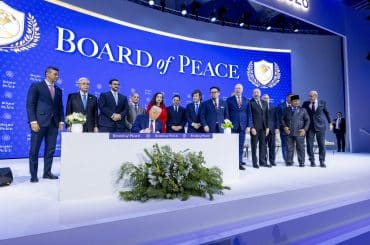The Chronicle of Higher Education is reporting that the U.S. Education Department’s Office for Civil Rights will investigate charges of anti-Semitism at the University of California at Santa Cruz based on a complaint that the university ignored concerns that criticism of Israel was “creating a hostile climate for Jewish people on the campus.”
You can read a letter from the Dept. of Ed announcing the investigation here. The move is the first such investigation since the Department announced last October that they were expanding federal anti-bullying guidelines to include religious groups with “shared ethnic characteristics.” Previously, the relevant civil rights statute, Title VI, did not explicitly cover religion. This was a move applauded by Israel supporters, such as the Zionist Organization of America, who saw it as a way to criminalize activism critical of Israel on campus.
The lecturer who brought the complaint is Tammi Rossman-Benjamin, who teaches Hebrew at the school. You can read Rossman-Benjamin’s complaint to the Education Department here. Among the events she sites as examples of anti-Semitism on campus was a screening of the film Occupation 101 and another event called “Understanding Gaza.” This event featured speakers from Jewish Voice for Peace which she characterizes as “an extreme and disreputable fringe of American Jewry.” The Chronicle quotes her letter:
The anti-Israel discourse and behavior in classrooms and at departmentally and college-sponsored events at [Santa Cruz] is tantamount to institutional discrimination against Jewish students, which has resulted in their intellectual and emotional harassment and intimidation, and has adversely affected their educational experience at the university.
Reading over the complaint, it’s hard to believe that anyone took it very seriously. Rossman-Benjamin’s ulterior motive of silencing criticism of Israel is obvious, and she has even written openly about it. In a piece titled “Anti-Zionism and the Abuse of Academic Freedom” that she wrote for Dore Gold’s neocon thinktank the Jerusalem Center for Public Affairs, Rossman-Benjamin laments:
The foregoing analysis has amply demonstrated that anti-Zionist and anti-Semitic discourse has found academic legitimacy on at least one major university campus and is allowed to flourish because faculty and administrators are unwilling to address, or even acknowledge, these abuses of academic freedom.
To answer how this case has found support at the highest levels of government it helps to look at who is helping push it forward, and how the Department of Education’s new policy was created in the first place.
The case is being heavily supported by an organization called Institute for Jewish and Community Research (IJCR) a San Francisco-based organization which is “devoted to creating a safe, secure, and growing Jewish community.” A large part of that work is focused on documenting and exposing “anti-Israelism and anti-Semitism.” This project is headed up by Kenneth L. Marcus, who incidently served as the Education Department’s assistant secretary for civil rights from 2002 to 2004, and was the Staff Director at the United States Commission on Civil Rights during the Bush Administration. In fact, Marcus helped lay the groundwork for the new Dept of Education bullying policy with a 2004 policy letter that advocated for the change.
Although Marcus must have been responsible for a wide array of civil rights concerns during his time in government, it seems there is one issue close to his heart. Here is a list of his publications as listed on his wikipedia page:
- “The Second Mutation: Israel and Political Anti-Semitism”, inFocus Spring 2008 • Vol. II: No. 1
- “Anti-Zionism as Racism: Campus Anti-Semitism and the Civil Rights Act of 1964”, February 2007 issue of the William and Mary Bill of Rights Journal (pp. 837-891, published by the students of the William and Mary Law School)
- “The Resurgence of Anti-Semitism on American College Campuses”, Current Psychology, Vol. 26, Nos. 3 & 4, 2007
- “The Most Important Right We Think We Have But Don’t: Freedom from Religious Discrimination in Education”. Nevada Law Journal, Vol. 7, p. 171, 2006
- “Jurisprudence of the New Anti-Semitism”, Wake Forest Law Review, Vol. 44, 2009.
His IJCR also mentions his new book Jewish Identity and Civil Rights in America. Seems to be a bit of a one trick pony. Predictably, Marcus is celebrating the government’s decision and sees wide ranging ramification for the Rossman-Benjamin’s complaint. A IJCR press release quotes him as saying:
This case is extremely significant for four reasons. First, it is opened just as International Apartheid Week activities are being held around the world and illustrates the potential ramifications of extremist protest activities. Second, it follows right on the heels of a federal lawsuit alleging similar problems at the University of California Berkeley just a few days before and may illustrate a broad trend. Third, it is only the second major systemic anti-Semitism case that OCR has opened and may have important precedential value. Fourth, it is the first major case to follow OCR’s new campus anti-Semitism policy and may demonstrate whether OCR means what it says about its commitment to addressing hate and bias in federally funded higher education programs.
It’s hard to believe the complaint will be held up, but I also would never have thought it would go this far in the first place. Guess it helps to have friends in high places.

